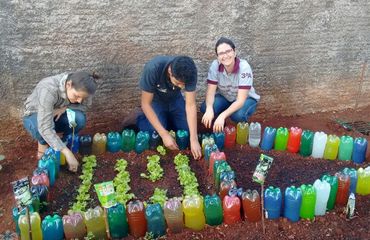São Paulo – Public school Prof. Dimas Mozart e Silva, in Taquaritinga, 336 km from São Paulo, is a finalist in the Zayed Future Energy Prize in the Global High Schools category. The prize is sponsored by the government of the United Arab Emirates and will offer up to USD 100,000 to be used in the implementation of the sustainability projects in the winning schools.
The Zayed Prize’s global high schools category awards one school in each of the continents (Americas, Europe, Africa, Asia and Oceania). Besides the school from Brazil, others from Bolivia and Mexico are also in the running as Americas’ schools. The winner will be announced in January 2017.
Science and Biology teacher Viviane Cristina Silva Ramos was the supervisor of the project from the São Paulo state school. She says that the project that was entered for the prize was based on the students’ suggestions. “The students researched, sent ideas, recorded videos. I gathered the ideas on what they dreamed to change in the school, on what could change to create a more sustainable school”, she explains.
The eight-page project was written by her and translated to English by the consulate of the United Arab Emirates in São Paulo. Among the students’ plans for a more sustainable school are adding thermal countertops in the cafeteria so the students can serve themselves, building a cistern to collect rain water and a composter for the organic vegetable garden, painting walls with waterborne paint, replacing incandescent light bulbs with LED lights, installing solar panels for power generation, replacing faucets and toilet flushes for water-saving models, and installing translucent roof tiles for better use of natural light.
According to Ramos, since 2013 the São Paulo state school organizes sustainable actions. “We have a simple vegetable garden and try to raise the awareness of the students on recycling and energy saving, so they can take home these ideas”, says the teacher.
As a way to promote the sustainability concepts among the residents of Taquaritinga, the project by the Dimas Mozart e Silva’s students also includes turning a class that was not being used into a space for activities concerning the topic. “The idea is to create a room to hold workshops on sustainability and creative games, bringing lectures and engaging the community”, says Ramos.
Currently, the school has 426 students from 11 to 17 years of age, from elementary to high school levels. According to Ramos, if the project wins the prize, the high school students will implement it.
In January, the teacher will travel to Abu Dhabi for the Zayed Prize award ceremony. She will be together with students Letícia Castro and Vinícius Ferrari, both high school sophomores. According to the teacher, they were the ones chosen for the trip due to their active role in the project’s development. “It’s a large project, set to change a lot of things in the school. We are very hopeful”, she said.
The award
The Zayed Future Energy Prize was created in 2008 and distributes USD 4 million in awards every year to projects that promote sustainable actions and the use of renewable energy.
The award has five categories: large corporation; small & medium enterprise; non-profit organization; lifetime achievement; and global high schools.
According to Ana Paula Fava, head of the Special Advisory to International Affairs of São Paulo state, in the last two years the award’s organization has worked to advertise the event in the state.
“In the last two years, the Special Advisory for International Affairs has been receiving frequent visits by the event’s organizers, such as director Nawal Al-Hosany, for São Paulo state to be active regarding the award. Some meetings with the Education and Energy secretariats were crucial for the schools to get involved and we could achieve this result that is so important to the students. This is the first time that a Brazilian school is a finalist of the award. And the goal is for this to be the first of many others Zayed prizes that the São Paulo state school system plans to achieve”, said Fava via email to ANBA.
*Translated by Sérgio Kakitani




